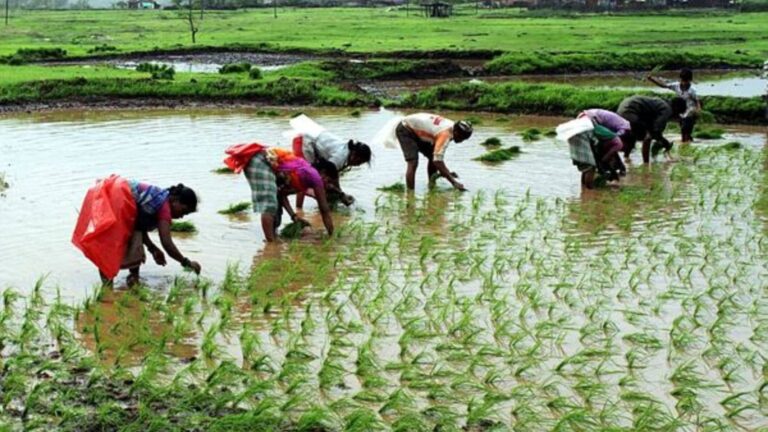
16 March 2021, Gatundu, Kiambu County, Kenya - Members of Kahuruko Farmer Field School prepare boards with information about AMR and chicken farming as an activity for the Farmer Field School at a farm in Kahuruko near Gatundu, Kiambu County, Kenya on March 16, 2020. Antimicrobial resistance is the ability of a microorganism to survive and grow in the presence of antimicrobial drugs that were killing or destroying it before. AMR develops naturally, but slowly, and can be accelerated by overuse or misuse of antimicrobial drugs. The emergence and spread of antimicrobial resistance (AMR) in several microorganisms is complicating the management of many infectious diseases. AMR is a major threat to human development and the fight against infectious diseases. It endangers animal health and welfare, as well as food production. AMR also adversely affects the functioning of human, animal and plant health systems and economies. Interventions were set up by FAO and GoK in Gatundu North to target timely vaccinations, hygiene and proper feeding of the birds to prevent disease, reducing the use of drugs to stop AMR. The interventions were based on Farmer Field School (FFS) approach, where farmers (3 farmer groups) have been meeting at the demo farms (3 farms) on a weekly basis since September 15th 2020. In each of the FFS trainings, two facilitators (previously trained on how to run FFS) are engaged to guide the discussions. Photo credit must be given: ©FAO/Luis Tato
The Food and Agriculture Organization of the United Nations (FAO) has unveiled a bold 10-year initiative aimed at curbing the excessive use of antimicrobials in farming practices. This initiative, titled Reduce the Need for Antimicrobials on Farms for Sustainable Agrifood Systems Transformation (RENOFARM), comes as a response to the escalating threat of Antimicrobial Resistance (AMR) in the food and agriculture sector. AMR poses significant risks to terrestrial and aquatic animal health, plant life, environmental sustainability, and global economic stability.
FAO Director-General’s Statement
Director-General of FAO, QU Dongyu, emphasized the urgent need for innovative approaches to tackle the widespread use of antimicrobials in livestock production. In a video message announcing RENOFARM, Dongyu stressed the critical importance of safeguarding public health, ensuring animal welfare, and preserving the environment while enhancing agricultural productivity.
Policy Support and Objectives
RENOFARM aims to provide comprehensive policy support, technical assistance, capacity building, and knowledge sharing to countries worldwide. Its primary objectives include reducing the dependency on antimicrobials in livestock production, prioritizing animal health and welfare, mitigating environmental impact, and enhancing global food security and nutrition. The initiative aligns with the 2030 Agenda and its Sustainable Development Goals.
Partnerships and Implementation
Working in collaboration with governments, farmers, the private sector, civil society organizations, and other stakeholders, RENOFARM will promote the adoption of the “5 Gs” at the farm level: Good Health Services, Good Production Practices, Good Alternatives, Good Connections, and Good Incentives. FAO aims to implement RENOFARM in over 100 countries, in coordination with its partners under the Quadripartite One Health approach, including the World Health Organization (WHO), the UN Environment Programme (UNEP), and the World Organisation for Animal Health (WOAH).
Pilot Programs and Progress
Pilot programs for RENOFARM are already underway, with a focus on the poultry sector in Indonesia’s Lampung province, supported by local government agencies and stakeholders. Similar initiatives are being piloted in Uganda and Nigeria. In Lampung Province, the establishment of a Farmers Field School (FFS) aims to empower local farmers, enhance their awareness of AMR control, and promote sustainable farming practices.
Upcoming Events and Global Commitments
The ongoing efforts will culminate in concrete commitments and actionable steps at the upcoming 2024 United Nations General Assembly High-Level Meeting on AMR in New York and the 4th High-Level Ministerial Conference on AMR in Saudi Arabia. FAO will also host the inaugural Global Conference on Animal Health Innovation, Reference Centres, and Vaccines in September, focusing on sharing insights, exchanging experiences, and identifying strategies to combat AMR and promote sustainable livestock transformation.
Antimicrobial resistance poses a formidable global threat to human health, animal welfare, environmental sustainability, and food security. By reducing the need for antimicrobials and preventing the emergence of resistant pathogens, initiatives like RENOFARM play a crucial role in safeguarding the world’s ability to combat diseases, ensuring food safety, and protecting the environment for future generations.






